Blogs
The Hydro Solution to Sewage Discharges
10/02/2023
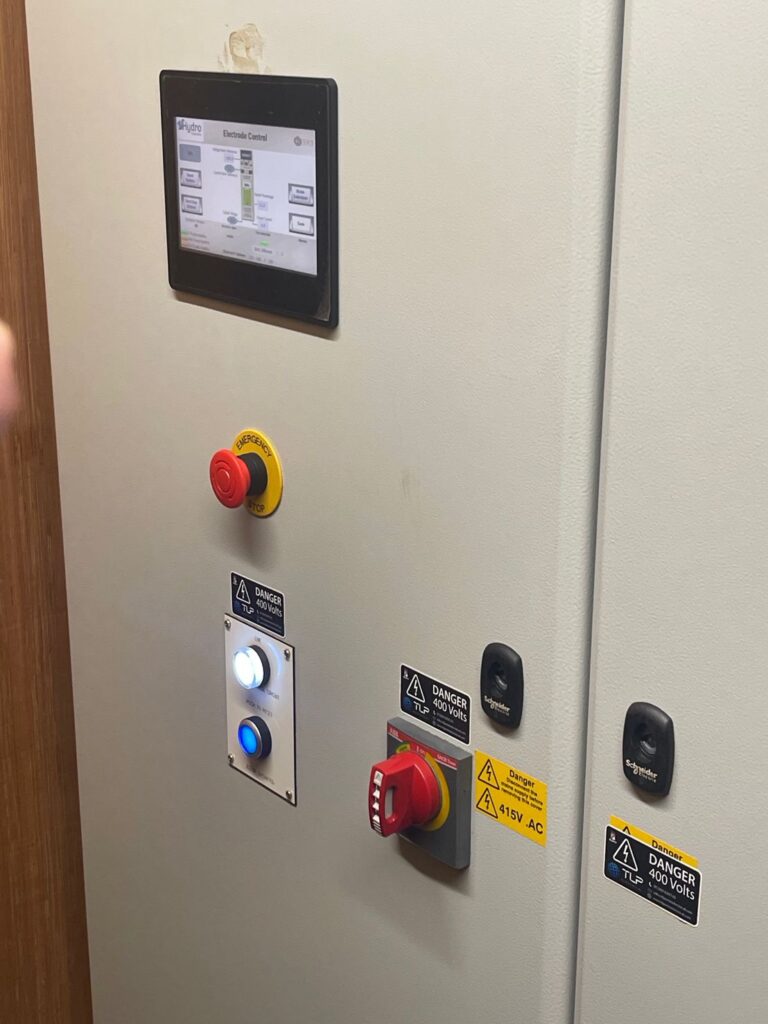
Raw sewage spilling into the sea last summer caused understandable public outrage and there is massive concern at the scale of discharges into Britain’s rivers. Here, our CEO, Wayne Preece, explains how Hydro can help.
Let’s face it. It’s revolting. Domestic waste – to put it politely – should not be pouring into the clear waters where some of us swim, surf, canoe or fish. But it does, and last August alone, more than 90 beaches were affected. Some of our great rivers are under more sustained threat from ongoing discharges that some water companies are simply failing or refusing to get to grips with. So we at Hydro were delighted to be asked by one of the more responsible utilities to take part in a trial to see what our technology can do to reduce the problem. And that system is rapidly taking shape at our Research Centre in Llangennech. All you see in these photos are valves and pipes, but this prototype will be able to handle 7 thousand litres of effluent an hour, recovering solids that can be transformed into fuel or fertiliser, alongside clean water that will pose no threat to Mother Nature. We deploy our refined electrochemistry to change the state of the most harmful phosphates producing what our scientists call “lumpy” liquid which we can then flocculate or filter. I won’t give away the technical detail but we will shortly enter the trial confident of success after which every water company should be aware that the technology really does exist to boost their capacity and end the scandal of dirty discharges
New Hydro Research Centre
06/02/2023
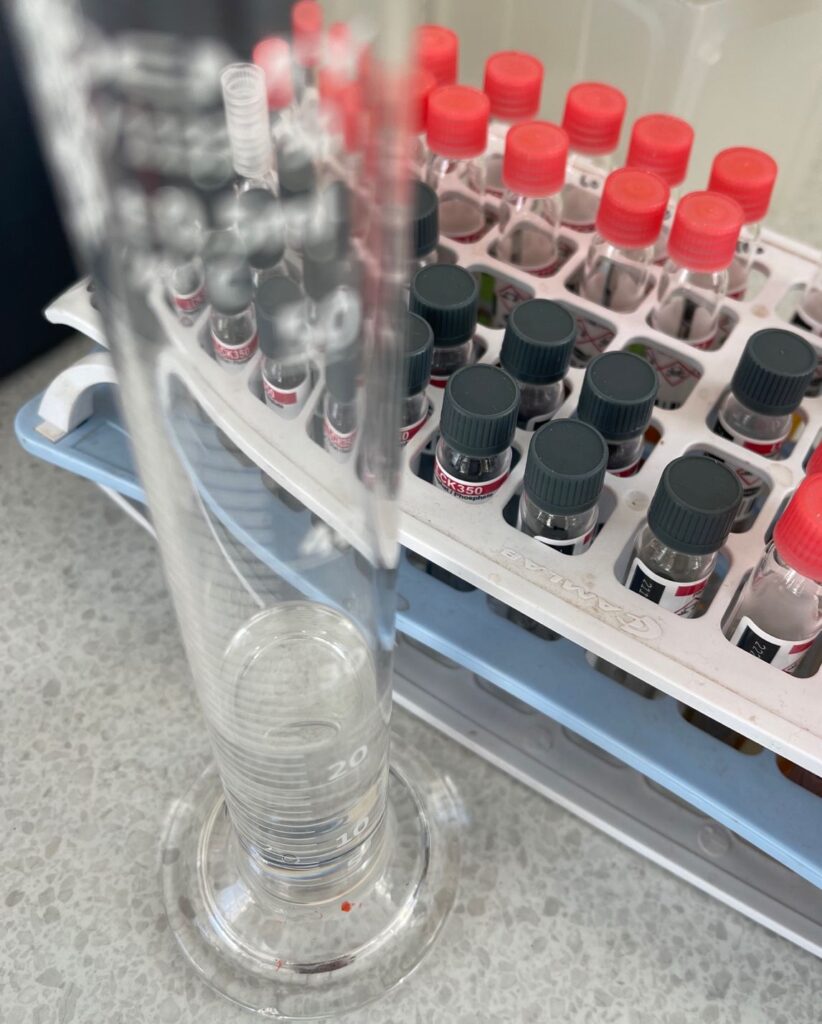
Our CEO, Wayne Preece, explains why a substantial upgrade of Hydro’s laboratories is underway at our research centre in Wales.
The word “lab” conjures certain images for some of us, probably associated with school. I’m thinking white coats, test tubes, Bunsen burner, maybe some microscopes. During my tenure at Hydro it’s been reassuring to see some Pyrex dishes in play alongside the more sophisticated tools of electro-chemists, but what we are installing now is truly humbling.
The purpose of our research centre is pretty straightforward. Clients send us samples of the contaminated liquids. We break them down to establish what exactly is there and analyse what we need to take them out.
This work will never stop. But we are now exploring another angle. We are basically creating a catalogue of friendly microbes and testing them to establish which pollutants each one is capable of targeting.
The potential is there if using natural organic materials to clean up rivers, lakes, oceans and man-made pools of dirty water. And our teams will know which agent to use in different scenarios.
Building that capability is an ambitious task. In the past we would have needed vast space, expensive incubators and a lot of human effort to explore what was working well and what was not.
But we’re now creating a smart lab where the same space can be put to much better use and help our scientists to stay ahead of the game
The future is now – or very close at least.
Corporate Best Practice
27/10/2022
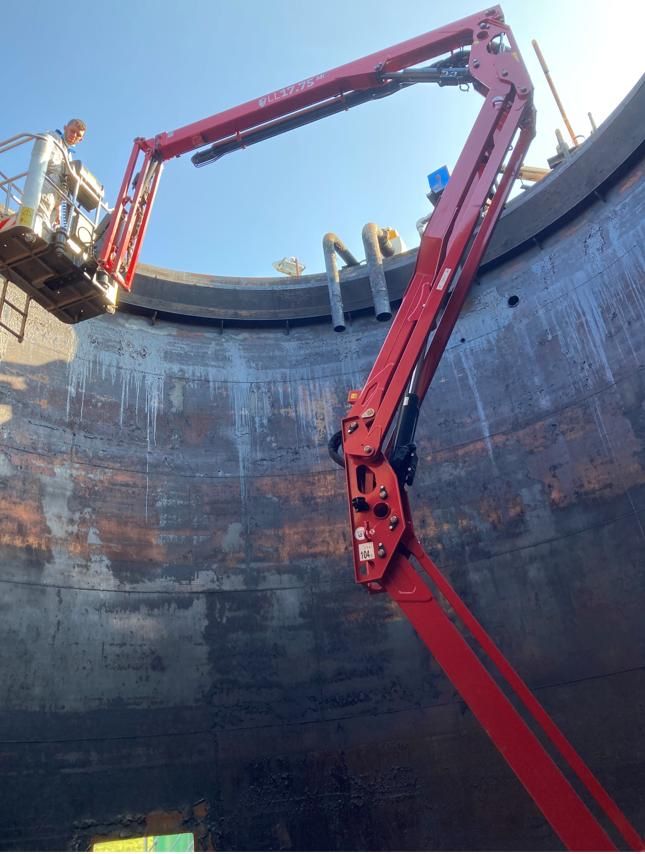
Weeks before the world gathers in Egypt for COP27, our Programme Manager, David Jones, heralds a Hydro client for using our technology to raise its environmental standards.
If every client was this responsible, the world would be a noticeably better place. They’ve asked not to be named but Hydro have been working with them for many years.
We were initially asked to save water in their heavy production process. We salvaged 85 million litres a year, and recovered some valuable materials by doing so.
Had the wastewater from their plant been discharged locally, it would have caused major damage. We helped them avoid that and would encourage others to follow their example.
But this firm went further. When they had finished with parts of their operation, they could have left them left them as they were and locked up. Instead they asked us to do a deep clean and the pictures here tell the story far better than I could describe it.
What you see here was filthy, four steel tanks and a concrete bowl heavily soiled with sludge. Our kit, in the hands of resourceful, determined staff took care of it, and everyone’s thrilled with the outcome. Hydro have now been asked to sort out other parts of the site which are more challenging but clearly doable, and we are pleased to get going.
Left like this, without a dirty legacy, the site poses no risk to the local environment and is far more likely to be put to further use in future. World leaders and captains of industry at COP27 should remember that technology is their friend in the battle to save our planet. Deploying it helps the environment whilst simultaneously creating jobs and growth; a win-win for all.
Queen Elizabeth
15/09/2022
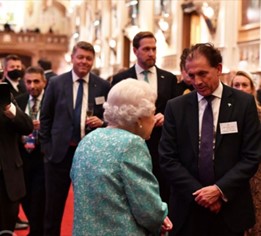
As the public queue to pay their final respects to Queen Elizabeth, our CEO, Wayne Preece recalls his brief encounter with Her Majesty last year.
The world’s business elite aren’t often made to stand in line. But from Bill Gates to John Kerry and a whole host of more humble executives like myself, it was a joy to queue at Windsor castle last October. The Queen’s reception was the climax of the Global Investment Summit, organised to showcase some of the more environmentally innovative British companies ahead of COP26. In she walked with a beaming smile patiently focussing on everyone who was eager to meet her.
The Prime Minister at the time, Boris Johnson introduced me as “the man from Wales doing wonderful things with water!” She made my day.
I knew she worked hard. I could tell she gave everyone 100%. But to think that she routinely saw tens of thousands of people in moments like this every year was astonishing. And she did so for decades, each occasion building what business would call a brand that ended up the most respected, reassuring and resonant in the world.
Most of us balk at seeing our face in the paper. TV is definitely scary but imagine every note and coin, every passport and so much else bearing your features. No one was more tested, more recognised and is now more enduring. It’s those qualities we – at Hydro – admire in her, and it’s those qualities we salute as we join everyone else in mourning her loss.
World Water Day
22/03/2022
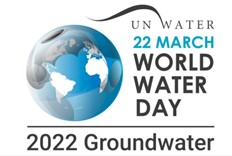
With Groundwater as the theme this World Water Day, it gives me an opportunity to share some of the insight into Hydro’s ability to harness and efficiently purify the resource. With the effects of climate change worsening, the precious commodity that is safe clean water, will become more of a valued resource, and having the technological expertise to treat and reuse ground water will be more important than ever.
Hydro is proud to have deployed innovative groundwater purification technologies for clients and partners around the globe, from agriculture farms in Egypt, to water scarce communities in India, Bangladesh and sub Saharan Africa. Hydro’s technologies are developed to specifically target constituents within the water, with a key focus on minimising waste by-products. A prime example of this work, is the development of Hydro’s EC (Electrocoagulation) technology, which is able to uniquely target Arsenic from groundwater sources. Hydro is delighted to be working with the NGO BRAC to transpose this work into the field, and to deploy life saving purification systems for communities whose groundwater, and only water source, is compromised by highly toxic Arsenic.
Each year World Water Day is a day for us at Hydro to celebrate the precious commodity that is water, and that access to, and use of clean water, is a privilege we aim to give to as many people as possible. With factors such as climate change and the tightening of environmental regulations impacting the water industry globally, we at Hydro are committed to being change-makers, by developing new technologies to help businesses be more environmentally friendly with their effluent, and so that access to clean Water can continue to be a privilege, more and more people have access to.
Wayne Preece, Group CEO
Bangladesh
22/10/2021

Providing safe drinking water in Bangladesh became a personal mission for Hydro chemist, Lewys Isaac. Now that the first site is complete – he wants much more.
One look at the river running through the impoverished community of Morrelganj and you could tell that drinking the water was a bad idea.
Back in the lab I was horrified to find dangerous levels of bacteria, parasites, e-coli and – in some cases – arsenic. No-one should have to choose between dying of thirst or drinking contaminated water. So it gives me great comfort to see the Hydro system ramping up from 700 to around 4000 litres a day. Each jar holds 20 that’s as safe as the water we drink in Wales, and we are now distributing to local businesses.
As the photos show, it’s still pretty primitive and small in scale but we are now talking to partners about a potential programme that could encompass a hundred sites, providing water for 250,000 people and creating or safeguarding nearly 3000 jobs. There are other plans for environmental clean up alongside our humanitarian work and though the challenges will be considerable I cannot think of a more fulfilling role.
Global Investment Summit
24/10/2021
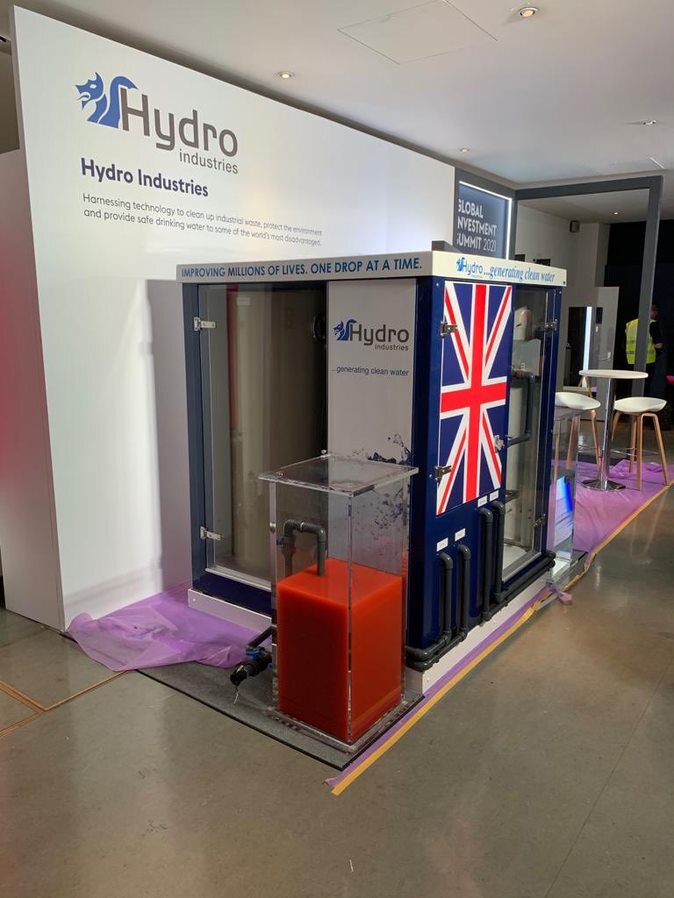
After showcasing our technology at The Global Investment Summit, CEO, Wayne Preece, is back abroad chasing leads.
Dinner with the Queen at Windsor Castle was a unique privilege I won’t forget. And it ended a day of intense and unprecedented networking with some of the world’s leading entrepreneurs.
But a feast of local delicacies with new friends and potential business partners in Saudi Arabia this weekend was equally significant. We arrived as the Kingdom announced its plans to achieve net zero greenhouse gas emissions by 2060, and we are extremely excited about the prospect of helping them with their wider environmental ambitions.
Hydro have already proved to the National Water Company here that our technology can be a huge help in the critical battle to salvage water in this region, and I was proud to inspect the Heet plant we built in Riyadh which is now processing 2,500 tonnes a day of domestic sludge.
With NWC’s ambition of recovering water and reducing waste, Hydro is now able to do just that. With our help they can salvage over 90% of the water.
Having proved that, there is no end to their appetite for greener solutions, we look forward to discussing how much more we can do together in future. Their vision, our execution. Now there’s a worthwhile partnership. Good for KSA, good for Hydro, and good for the planet.
Bangladesh
30/08/2019
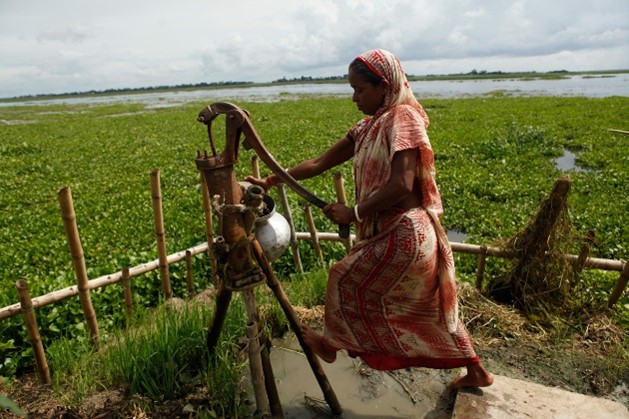
It’s a cruel, painful paradox that a small but densely populated country, can be flooded relentlessly yet remain persistently short of safe water. 80% of Bangladesh is floodplain and it has a vast coastal region. Every year, about a fifth of the country is sunk, displacing thousands and destroying their homes, wellbeing and dreams.
Among the many threats the region faces, increasingly common climate events including cyclones, tidal surges, and more have begun to infiltrate the local freshwater supply with numerous poisonous contaminants. As a consequence, communities dependent on clean groundwater for their health and livelihoods are struggling to access and pay for services that purify their water. And while this challenge is widely acknowledged, another element makes clean water access difficult: many of these communities are in hard-to-reach areas where investments in solutions are both high risk and high cost.
Thanks to P4G – a global group of principled and progressive leaders – Hydro Industries is now able to provide its ground-breaking water technology in collaboration with the world’s largest NGO to address this challenge in its own back yard.
BRAC, founded in Bangladesh in 1971, is a global leader in developing and implementing cost-effective, evidence-based programmes to assist people in the most marginalised situations. These include initiatives in education, healthcare, microfinance, women’s and girls’ empowerment, agriculture, human and legal rights.
Multiple organisations work in the water sector in Bangladesh, but solutions often exacerbate the problem – providing the most basic of pumps to deliver groundwater that can be dangerously contaminated. Many pumps in Bangladesh are contaminated with arsenic and yet due to no or unaffordable options people are still drinking this unsafe water.
The World Health Organisation estimates that 140 million people in 50 countries are using water contaminated with arsenic.
Hydro’s solutions, pioneered and refined in a country that is blessed with seemingly endless access to this most precious of natural resources, will enable BRAC to apply their proven delivery models to stimulate and utilise local private businesses and micro-entrepreneurs to move the clean water to households in need. This system will create new ways of delivering safe drinking water at high volumes and affordable prices ensuring that people in marginalised situations can enjoy what most of us take for granted.
Our technology has proved its worth in challenging situations across India, the middle-east and closer to home. Passing an electric current through contaminated water allows us to isolate the impurities and filter them off effectively so that the water emerging from the tap meets the highest possible standards demanded by the World Health Organisation. Now it can add significant capacity to aid agencies across the globe, removing their dependence on poor quality, inferior and potentially unsafe technologies and solutions.
We believe that the most vulnerable, migrants, refugees and the poorest have the right to enjoy safe water, and it is through such technologies that we can lift these standards and make the WHO standard a global gold standard of quality that every responsible government, multilateral or INGO insist upon.
In collaboration with BRAC we are busy doing the groundwork so we can deploy our technology next spring and, working with local communities and municipalities, find new ways to deliver safe water to all households, no matter the social and economic capacity. In the first phase 25,000 people will benefit whilst learning from this phase will inform our transition to scale with the potential to reach millions across Bangladesh and other areas in India and Nepal with severely contaminated water sources.
We really believe this partnership will show its potential – not only in Bangladesh but for any community desperate for this crucial natural resource.
Written by Wayne Preece, Chief Executive Officer of Hydro Industries.
Follow us
Contact
Hydro Industries Ltd.
16 Berkeley Street
Mayfair
London
W1J 8DZ
+44 (0)1554 821333


